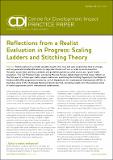| dc.contributor.author | Punton, M | |
| dc.contributor.author | Vogel, I | |
| dc.contributor.author | Lloyd, R | |
| dc.date.accessioned | 2016-04-18T14:28:58Z | |
| dc.date.available | 2016-04-18T14:28:58Z | |
| dc.date.issued | 2016-04 | |
| dc.identifier.citation | Punton, M.; Vogel, I. and Lloyd, R. (2016) Reflections from a Realist Evaluation in Progress: Scaling Ladders and Stitching Theory, CDI Practice Paper 18, Brighton: IDS | en |
| dc.identifier.uri | https://opendocs.ids.ac.uk/opendocs/handle/20.500.12413/11254 | |
| dc.description.abstract | Realist evaluation provides valuable insights into how and why programmes lead to change,
and can generate transferable lessons to help practitioners roll out or scale up an intervention.
However, as yet there are few standards and guidelines governing what counts as a ‘good’ realist evaluation. This CDI Practice Paper, written by Melanie Punton, Isabel Vogel and Rob Lloyd, reflects on the first year of a three-year realist impact evaluation, examining the Building Capacity to Use Research Evidence (BCURE) programme funded by the UK Department for International Development (DFID). It describes some of the challenges faced and lessons learned, providing insights into the potential value of realist approaches within international development. | en |
| dc.description.sponsorship | UK Department for International Development | en |
| dc.language.iso | en | en |
| dc.publisher | IDS | en |
| dc.relation.ispartofseries | CDI Practice Paper;18 | |
| dc.rights.uri | http://creativecommons.org/licenses/by/3.0/ | en |
| dc.title | Reflections from a Realist Evaluation in Progress: Scaling Ladders and Stitching Theory | en |
| dc.type | CDI Practice Paper | en |
| dc.rights.holder | IDS | en |
| dc.identifier.ag | OT/11009/7/3/1/623 | |


